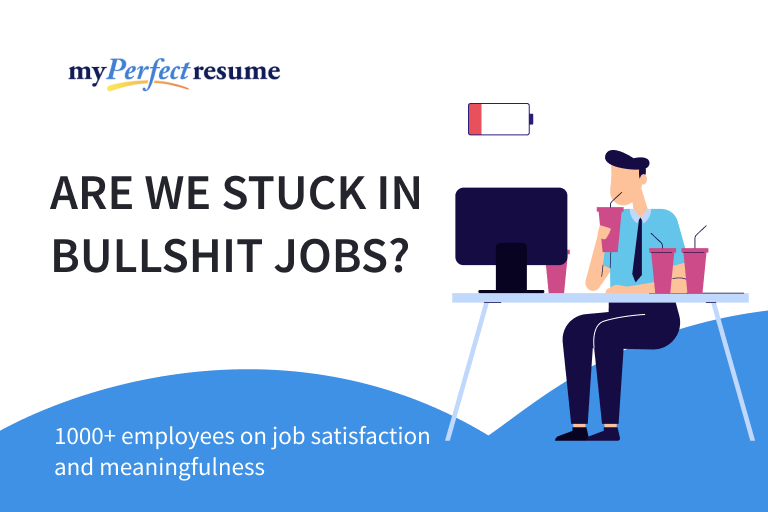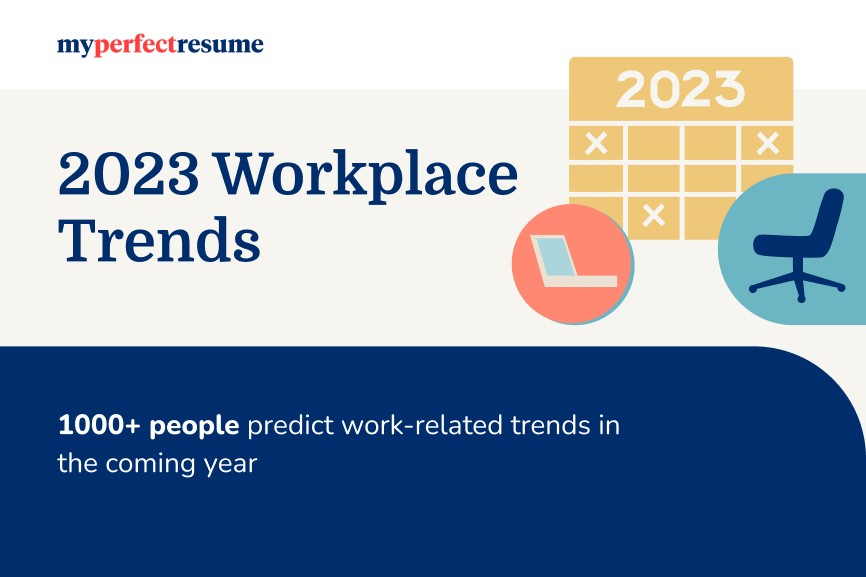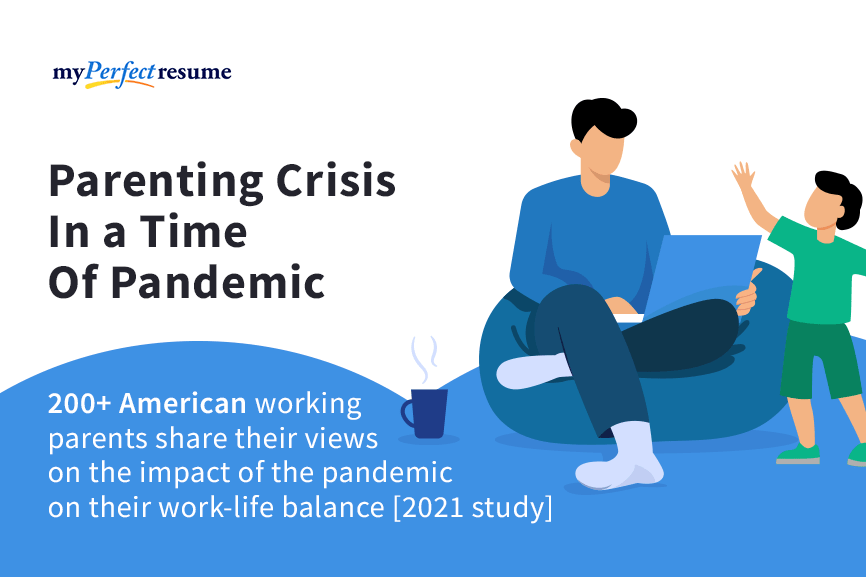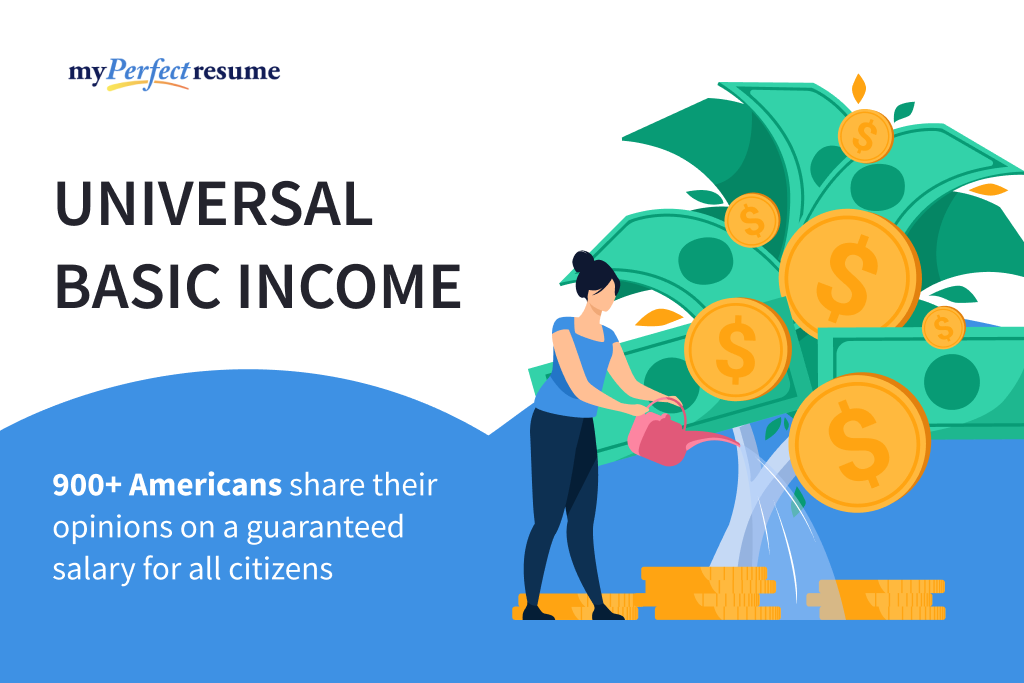Our customers have been hired at: *Foot Note
Work will consume 1/3 of your life. In words: one-third. Getting goosebumps? Me too.
That’s 90,000 hours over the course of a lifetime. Add in commuting if it applies. The numbers speak for themselves.
In a survey taken by more than 1,000 employees, we asked respondents about their attitudes toward job satisfaction and job meaningfulness.
Want to know more? Keep reading and look at the research findings.
If you’re (un)happy and you know it
Yards. Amperes. Ounces. And the like.
So many units to choose from. But none of them applies here. Feelings have their own rules. To measure job satisfaction and meaningfulness, we should take a more “indirect” approach.
Distance, power, and weight have many dimensions, as you can see—
“How far are you from your dream job?”
“Do your current work duties make you happy?”
“Feeling overwhelmed by carrying a great weight of responsibility on your shoulders?”
Emotions can’t be reduced to numbers and figures. Yet, scientists continue their efforts to investigate what makes a job satisfying and meaningful. Is there any secret formula? Heaven only knows.
If you are ready to leave your current job to explore new opportunities, we recommend checking out our guide on how to write a resignation letter.
However, we can get a hint from the Team Building Company’s 2025 compendium of job satisfaction statistics and facts. The key findings are as follows:
- Employees enjoy the flexibility and control that remote work provides. Work from home turns out to be essential to job satisfaction.
- 77% of respondents claimed that having the option to work remotely post-COVID would make them happier, while 66% admitted that they would be less happy if remote work was eliminated.
- More and more companies take a human-centered approach by putting a greater emphasis on employee wellness, worker happiness, and positive company culture.
- Lack of work-life balance is the top motivation in looking for a new job, and the main catalyst for job changes.
- On the other hand, job satisfaction and work environment are the most important reasons why employees stay.
- Respectful treatment of employees at all levels is the top contributor to job satisfaction, while trust is the second most important.
Now for our findings. To begin with, we asked the respondents how much they agreed or disagreed with the following statements:
- My job gives me a sense of satisfaction.
- I like my job.
- My job is meaningful.
Almost three quarters of the interviewees claimed they like their jobs. What’s more, 7 out of 10 believe that what they do is meaningful. Not enough? Those who can get no (job) satisfaction comprise less than 10% of all surveyed. Apologies to Sir Mick Jagger.
Who are our positive-attitude-winners then?
As the research revealed, the most satisfied employees are those:
- Working for a company with 201-500 employees—82%.
- With an annual income between $50 000 and $74 999—81%.
- With work experience between 6 and 10 years—80%.
- Working in the business and finance industry—79%.
No surprise here, satisfaction level and job affection go hand in hand. The percentage difference between these two is minor. The below-mentioned employees, who like their job a lot, are also those most satisfied with it:
- Working for a company with 201-500 employees—85%.
- Working in the business and finance industry—81%.
- With an annual income between $50 000 and $74 999—80%.
Now, time for job meaningfulness. We have a dead heat here. The gold medalists, with 81% of agree and strongly agree answers, are:
- Employees from the business and finance industry.
- Employees from the healthcare industry.
Well done, guys!
The research findings didn’t reveal any significant differences in responses with regard to gender and age. All in all, the surveyed seem happy with their work life.
So what’s the catch then? Actually, there isn’t one. Oh, wait…
Education matters. Face it
Well, let’s be honest here. The data speaks for itself. Just take a look at attitudes presented by respondents with different educational backgrounds.
When it comes to employees with no college degree:
- 58% feel satisfied with their job, 22% do not.
- 61% like their job.
- 1 out of 3 believes that what they do makes no meaningful contribution to society.
On the contrary, as many as three-quarters of degree holders are satisfied with their job, like it, and consider it meaningful.
Education pays off. In job satisfaction currency, at least.
Sure, a college degree is not a guarantee of future job success. Still, having it as an ace up in your sleeve makes you more likely to succeed later on. With a broader range of career opportunities, better earnings, and more stable employment, your work life gets brighter.
Here’s how Dawn D. Boyer, Ph.D., CEO of D. Boyer Consulting comments on the link between education and job satisfaction:
As a coffee lover, I object. I could be surrounded by this mind-blowing smell forever, even as a professional. Or maybe it’s just easy for me to think like that when I’m actually writing the article and drinking coffee, not preparing it for the hundredth person this morning.
Still not convinced if education is that important? Well, it has been scientifically proven.
In 2018, a group of psychologists from Singapore and the Netherlands conducted a four-year-long study on links between education and life satisfaction. The sample comprised up to 9,669 individuals from the Netherlands. Research findings revealed that educated individuals were more likely to experience job satisfaction because they enjoyed a better person-job fit.
Not enough? Here is just one of the countless examples.
My decision not to pursue a degree has meant that, aside from financial issues, I have struggled to find personal fulfilment through working. In fact, I have never held a job that I have really cared about, except in terms of getting paid and making friends with other colleagues. That has become something of a regret to me, since I often see positions I think I would really enjoy, only to find I cannot apply due to not being a graduate.
-Eleanor
Confessions like that are not unique. Do a little digging and see for yourself.
So next time anyone tells you to “Go educate yourself”, think twice before you get offended. It may be a great piece of advice after all. At least when it comes to job satisfaction.
How does this compare with other research on this topic?
Our research is not the first one investigating job satisfaction.
In a 2013 survey of 12,000 professionals by the Harvard Business Review, 50% claimed they felt their job had no “meaning and significance”. Another poll conducted on 230,000 employees in 142 countries revealed that only 13% of workers actually like their job.
In 2015, YouGov asked British employees if their job “made a meaningful contribution to the world”. The survey 37% of the respondents said it didn’t, whereas 50% claimed it did, and 13% were uncertain.
A later poll in the Netherlands came up with similar results: 40% of Dutch workers reported that their jobs had no good reason to exist.
The dates change, opinions do not. To paraphrase Jimmy Buffett—changes in latitudes, same attitudes.
Not in the case of job satisfaction, though. According to the 2019 Randstad Workmonitor study, India leads the world in workplace satisfaction and clocks in at a bewildering 89%, while Japan takes last place with a score of 42%. The US shared the fifth place rank on the list with Denmark with a 78% rate of job satisfaction.
Let’s get back to meaningfulness. The question is how to tell a meaningful job from a pointless one. Any volunteers?
That makes sense
Well, meaning is a relative term, and a vision of a meaningful job would vary on what a person considers significant.
Maciej Kubiak, the Head of People at PhotoAiD, believes that:
At the same time, Renee Rosales, M.Ed. Founder and CEO of Theara, sees meaningfulness as the end goal and suggests that we should focus on “finding the right in right now”.
Sense is the sum of resultant forces. Like in a jigsaw puzzle, where every piece counts.
What makes a job meaningful then? Have a look at our respondents’ answers.
- Sense of purpose – 79%
- High salary – 77%
- Sense of satisfaction – 77%
- Opportunity to help other people – 74%
- Contributing to society – 72%
- Contributing to your employer – 68%
- Prestigious profession – 65%
People do things for a reason. And it shows.
We don’t like messing around. That’s why “sense of purpose” is number one the list.
What else have we got there? Oh, yes—high salary. Money talks. Fortunately, it’s not a monologue.
Let’s dig deeper.
People want to feel needed. They are willing to help, do meaningful things, and contribute to society. Prestige is not that important, as you can see.
A matter of life and death
When asked which professions are the most meaningful, the respondents named:
- Doctor – 44%
- Police officer – 39%
- Firefighter – 28%
- Nurse – 26%
- Farmer – 24%
What all of them have in common is making a contribution to society.
These jobs speak to fundamental human values. Safety, health, care.
Sorry not sorry. You don’t save lives here
Let’s change the perspective now.
The professions named by the respondents as least meaningful included:
- Reality TV star – 37%
- Social media influencer – 36%
- Professional athlete – 34%
- Corporate CEO – 31%
- Software developer – 27%
No life depends on any of these, right? Wrong.
Aren’t software developers the people we can thank for our modern lifestyle?
Cashless payment, online banking, remote work, and thousands more — rings a bell?
All of our infrastructure needs functioning software. It’s not just games and apps.
I’ll take the high ground here. Software developers should be respected. Period.
Especially now, when technology plays such an important role. In 2020 the world became more tech-dependent than ever before. In case you forgot.
Work in the time of COVID-19
The COVID-19 pandemic has been a revolution for most aspects of our lives, including work life.
Does it also affect the perception of your own job? How about other professions? We asked the respondents the following questions:
- Since the pandemic began, have you found your job to be more meaningful, less meaningful or the same as before?
- Since the pandemic began, has your opinion of jobs other than your own changed? Do you see other jobs and careers as more or less meaningful now?
It turned out that almost half (47%) of the surveyed Americans consider their job more meaningful now, while 14% think of it as less meaningful. 39% of the respondents haven’t changed their mind and believe what they do has the same amount of meaning as before.
Extreme situations are eye-opening. Is that why we see our jobs in a different light now?
Well, troubling times give us not only great stress but also a great lesson. We get a chance to look at things from a different angle. And that might be the case.
But is it only our job we believe to be more or less meaningful now? How do these brand new, wide-open eyes see other people’s jobs? Let’s find out.
Here are some of the opinions given by the respondents.
What jobs do you now consider as LESS meaningful since the pandemic started?
“I consider jobs such as retail (non-grocery stores and other non-essential stores) and entertainment (such as movie theaters and event staff) even less meaningful now because people are generally staying home and avoiding crowds. The sense of 'fun' has been lost since the pandemic started.”
“Any job that doesn't help anyone but your employer. So most jobs, I would say, are meaningless.”
“Jobs that exist simply to pay somebody essentially. Media jobs and all these people that just sit at home not really helping anyone.”
“Corporate jobs that only serve to improve a company's bottom line but really have no impact outside of that.”
“Middle-management type jobs where people are just in charge of others without actually doing much.”
“I don't consider any jobs less meaningful in the pandemic, except maybe those of elected officials. They're just as clueless as we all are, trying to find our way in the "new normal."”
“I would have to say that a professional cuddler would be meaningless. Yes, I know it’s hilarious but real.”
“In the COVID-19 era, the practical aspects of one’s job seem to win over the rest.
We want to stick to what’s helpful, direct, and measurable. So, if a profession doesn’t meet these requirements, we are likely to look down on it.”
“Our lives are way different now. So is our perspective on what’s meaningful.”
The pandemic has made it clear that a job’s value is not about money and prestige anymore.
Social utility. That's what matters. Which leads us neatly to our next question.
What jobs do you now consider as MORE meaningful since the pandemic started?
“Medical professionals such as doctors, nurses, medical assistants, pharmacists and medical or lab technicians have more meaningfulness and respectability to me as they are first-line workers helping patients during the pandemic. The same is true for EMTs or ambulance workers, in my opinion.”
“Jobs in the medical and emergency response fields are considered more meaningful because of the risks associated with the pandemic. Additionally, jobs that involve helping others, such as teachers and social workers, are considered more meaningful because of the importance of their work.”
“Frontline workers like healthcare professionals, retail employees and foodservice workers all deserve more respect and admiration for what they do. They make the "world go round" in ways that we didn't even realize before the pandemic began.”
“I think the delivery drivers are more meaningful. And not just the people who deliver from stores or warehouses to your door. I'm talking about the trucks that carry the stuff across the country. Without them we clearly would be screwed.”
“I consider jobs in the medical field more meaningful. All the people serving in the medical field have been through so much and they are what has kept our society going and I look up to them so much since the pandemic.”
The gold medal goes to medical professionals and delivery drivers. First-line fighters.
Those who saved lives and those who let us live ours a bit more normal. In the new abnormal.
When we had to “stay at home”, they couldn’t.
The time has come. Last question, the one of the greatest importance.
50/50 split. Okay. It doesn’t happen very often, does it?
Half of the respondents consider their job as a unsatisfying one, the other half don’t.
Hard to draw any further conclusions. Let’s have a look at a couple of some other highlights.
Finally, a chance to pull a rabbit out of a hat! Plot twist. The thrill we’ve all needed.
How about that:
The biggest groups of respondents classifying their jobs as unsatisfying ones are:
- Employees working in the educational industry (64%).
- Master’s degree or Doctorate holders (57%).
While respondents who don’t think what they do is a unsatisfying job are:
- Those with work experience of 20 years or more (70%).
- Employees with no college degree (61%)
Wait, wait, wait. How come? Isn’t it against what we’ve discussed at the beginning?
Not necessarily. However unexpected, the conclusion is as simple as ABC.
You can love your job and feel extremely satisfied doing it. No matter what. Even if it makes no point, no contribution to the world, and no difference to anyone.
You don’t have to prove that you're the greatest superhero of them all. Unless you want so, of course.
All in all, the world is big enough for Superman, Batman, Wonder Woman, and the rest of us. Saving lives or not.
And the unsatisfying jobs theory may be, well, wrong.
Andrew Sanchez, Associate Professor in Social Anthropology at the University of Cambridge, seems to share this opinion. Yet, he is more politically correct while presenting his views on Graeber’s theory.
I think that Bullshit Jobs is basically wrong. Nonetheless, I like the fact that a book like this exists, and I wish that there were more of them. (...) Even when Graeber was wrong, he made you think. And what he made you think about was invariably something important. That’s what an academic is for.
Bullshit jobs are not usually bullshit all the time. It would probably make more sense to rather talk of bullshit tasks. (...) I have spent my working life talking to people about their working life. And because I am an enthusiast, I tend to do this even when I am not ‘working’. My experience is that there are many jobs that I would find pointless to do myself, but which other people do not. That is because they have found a meaningful transformative dimension in their work that would elude me, and they, therefore, find it satisfying to manage IPOs, trade stocks, or write advertising copy. The transformative action of work needn’t happen in an instant. And indeed, it often takes lots of people to make it happen at all. People are smart enough to know this, which is why the daily grind of bullshit tasks does not necessarily translate into a wholly bullshit job.
Is this a comforting perspective? No unsatisfying jobs, only unsatisfying tasks. Well, maybe.
The results of spending life working like that can be equally harmful, though. No matter what the theory.
unsatisfying jobs side effects
Just a quick reminder—
1/3 of your life. 90,000 precious hours.
What may be the consequences of spending them on something you consider totally pointless, with no meaning at all?
- Negative impact on mental and physical health. In extreme cases, turning to drugs or alcohol, or even contemplating suicide.
- Increased risk of burnout, depression, and mental breakdown.
- Decreased self-esteem.
- Feeling disturbed, anxious, and stressed.
- Frustration, exhaustion, low mood.
- Sense of being unfulfilled with your life.
- Low engagement with work.
- The time that the job itself has taken away. You are unable to get it back.
Doing a unsatisfying job is just like pouring water on a stone. There’s no chance of growth.
And, what’s probably the worst, it may impact your private life. Not in the nicest way, to put it mildly. As there is a close connection between work and personal life and challenges in one area affect the other, doing a meaningless job can take your mental peace away.
Final thoughts
We are all links in a chain.
Jeremy Scott Foster, adventure junkie, travel photographer, and Founder & CEO of TravelFreak, shares insightful thoughts on how we all are, doing what we do, and being where we are.
No job is without meaning, no matter how much we are sometimes trained to think so. Every role plays a part in building a community both within that business and with the wider geographical community or online community. It is really important that we start to look at all roles with the respect they deserve because they each play a part in people's lives in some way or another. It is only in understanding that each job and role has meaning, that people can truly start to find satisfaction in whatever role they are in.
We, as a society, can sometimes focus too much on what a meaningful or important job is, and for those who are doing anything considered 'less than' it can be a massive demoralization which impresses a lack of job satisfaction on them, just through what they have been taught about specific roles.
There is no right or wrong to a role, and we should celebrate everyone that makes part of a professional chain because, without one of the links, the rest of the chain won't function properly.
And what if job meaningfulness is… well, just a matter of choice? James Green, the owner of Cardboard Cutouts, has no doubt that it is all up to us.
At the end of the day, whether you feel like your job has meaning or not is ultimately a personal decision. If you're spending 8 hours inputting data, you might be less inclined to feel like you're changing the world than you would be working for a business that's developing cancer drugs. Both examples, however, are necessary. You just have to decide if you want to equate your job with your life having meaning.
People want to put emphasis on what they spend the majority of their lives doing, but what if your job just provided you with a much-needed salary so that you could change the world when you're not at work? Is that person's job any less meaningful than someone who gets paid to change the world?
Your job's meaning is what you decide it is. If it's a means to an end, then it's a means to an end. If it's what you love to get up every single day and do, then that's what it is. You get to decide how you view your life each and every day. That decision is not made for you, but by you. So choose wisely.
Make up your minds, guys. It's crucial to remember that satisfaction comes from within. You shouldn't expect your job to provide all of it. Ultimately, it's up to you to find satisfaction in your work.
After all, work-life is not a trap, not a battlefield, and not a dead end. Or doesn’t have to be, at least. If you feel that you are stuck in whatever your job is, remember that there is always a way out. Not the way through only.
You can trust me. Been there, done that. Fingers crossed!
Methodology
We surveyed 1067 American respondents online via a bespoke polling tool. They were asked questions about their attitudes toward job satisfaction and sense of job meaningfulness. The survey questionnaire included mainly Likert scale-based questions related to levels of (dis)agreement with a statement. All respondents included in the study passed an attention-check question. The data presented represents the views of a randomized group of survey respondents and does not necessarily reflect the official policy or position of MyPerfectResume.
Fair use statement
Want to share the findings of our research? Go ahead. Feel free to use our images and information wherever you wish. Just link back to this page, please—–it will let other readers get deeper into the topic. Additionally, remember to use this content exclusively for non-commercial purposes.
About Us
MyPerfectResume is your one-stop destination for crafting an impressive resume and finding a fulfilling job. Explore our extensive resume examples, select from our wide range of professional resume templates, and leverage our resume builder to unlock your full potential.
How we reviewed this article
Since 2012, we have helped more than 11 million job seekers with our user-friendly tools and career advice articles. We have a rigorous editorial process to ensure that our content is helpful and accurate. Explore our recent employment studies and press coverage, and discover why our certified career experts are a trusted source for professionals worldwide.
Sources
- Bregman, R., “A growing number of people think their job is useless. Time to rethink the meaning of work”
- Duncan, E., “Review: Bullshit Jobs: A Theory by David Graeber — quit now, your job is pointless”
- Eleanor's Words, “Why I Regret Not Going to University”
- Glaser, E., “Bullshit Jobs: A Theory by David Graeber review – the myth of capitalist efficiency”
- Illing, S., “Bullshit jobs: why they exist and why you might have one”
- Ilies, R., Yao, J., Curseu, P. L., & Liang, A. X., “Educated and Happy: A Four-Year Study Explaining the Links Between Education, Job Fit, and Life Satisfaction. Applied Psychology”
- Robinson, A., “Job Satisfaction Statistics and Facts in 2022”
- Sanchez, A., “Work is Complicated: Thoughts on David Graeber’s Bullshit Jobs”
- Shtyrov, A., “Cambridge study questions ‘bullshit jobs’ theory”
- Soffia, M., Wood, A. J., & Burchell, B., “Alienation Is Not ‘Bullshit’: An Empirical Critique of Graeber’s Theory of BS Jobs”
Our customers have been hired at:*Foot Note

















